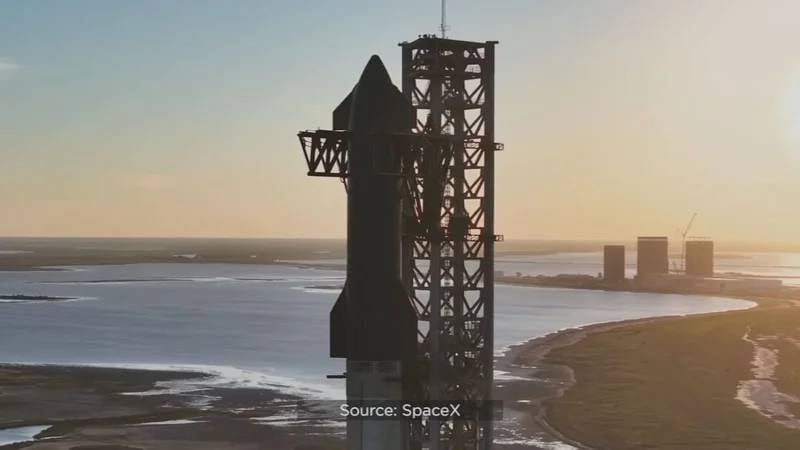So, another giant metal tube got shot into the sky on Monday, and everyone’s losing their minds. SpaceX’s 11th Starship test flight went up, came down in pieces exactly where they wanted it to, and the company comms team immediately declared victory.
I watched the livestream. I saw the cheers. I heard the announcer, Dan Huot, say, "Hey, welcome back to Earth, Starship," as the telemetry went dark over the Indian Ocean. And I have to ask: welcome back to what, exactly? The bottom of the ocean? Is that what we’re calling a successful return trip now?
It’s a win. Or, at least, it’s what SpaceX is calling a win, a sentiment reflected in headlines like SpaceX launches 11th test flight of its mega Starship rocket with another win. The booster peeled off and performed a "controlled entry" into the Gulf of Mexico. The main ship skimmed space, did some fancy maneuvers, and then nose-dived into another body of water halfway around the world. Nothing was recovered. Nothing was reused. They just proved, for the second time in a row, that their giant rocket doesn't violently explode before it’s supposed to.
And for this, we get a round of applause. Elon Musk, for the first time, even went outside to watch it himself, claiming it was "much more visceral." Offcourse it was. It's his train set, the most expensive and elaborate one ever built by a human. But does his presence on the ground fundamentally change what this is? It's a spectacularly expensive, controlled crash.
Is this progress? Sure. I guess. But is it the monumental leap for mankind the headlines are screaming about? Give me a break.
The Official Hype Machine
You can always count on the institutional players to get in on the action. NASA's acting administrator, Sean Duffy, was right there on X (you know, the platform owned by the rocket guy) to praise the flight as "Another major step toward landing Americans on the moon's south pole."
Let’s deconstruct that for a second. "Another major step." What was the last major step? The one in August that did basically the same thing? We’re celebrating incremental improvements on a system that still ends with the vehicle being destroyed. This is like a car company celebrating that their new prototype successfully drove off a cliff just like they planned. It’s a bizarre metric for success, but here we are.
This isn’t just PR. No, 'PR' doesn't cover it—this is a masterclass in narrative control. SpaceX, with NASA’s eager endorsement, is conditioning us to see these flights as historic victories. They're building a highlight reel of successful failures. By the time they actually try to land one of these things in one piece, we’ll have been so worn down by the "successful splashdowns" that anything short of a fireball will feel like the moon landing itself.

And what about the moon, anyway? NASA is completely, utterly dependent on this rocket to get astronauts from lunar orbit down to the surface. Their entire Artemis program hinges on a vehicle that, to date, has a 100% record of ending its missions at the bottom of the sea. Does that fill anyone else with a creeping sense of dread? Or am I just the crazy one here? We’re betting the farm on a rocket that’s still in its "don't-explode-too-early" phase.
A Solution in Search of a Problem
Every time one of these things launches, we get the boilerplate about Musk's grand vision: sending people to Mars. A multi-planetary species. A backup drive for humanity. It’s a compelling sci-fi story, I'll give him that. But it’s starting to feel less like a plan and more like the ultimate billionaire escapism.
We’re pouring untold resources, engineering genius, and media oxygen into a project to colonize a dead, irradiated rock, while the planet we’re currently on is… well, you’ve seen the news. It feels like we’re designing the world’s most advanced fire extinguisher while our own house is on fire. And everyone’s standing around cheering for the shiny extinguisher.
This whole spectacle is a perfect metaphor for modern tech culture. It’s not about solving the messy, complicated problems we have right now. It's about creating a new, cleaner problem to solve somewhere else. It’s easier to dream about Martian cities than it is to fix the crumbling infrastructure in our own. It’s more exciting to talk about "reusable vehicles" that ain't being reused yet than to deal with the unglamorous work of sustainability here on Earth.
And the mock satellites? They dropped eight fake Starlinks into the void. A practice run for cluttering up the sky with more space internet hardware. So the ultimate goal here is to use the world's biggest rocket to launch satellites so people can tweet about the world's biggest rocket. The whole thing is a self-licking ice cream cone of hype.
I’m not saying space exploration is pointless. I’m not an anti-science luddite. But the framing of this is what gets me. The breathless, uncritical adoration for what is, fundamentally, a very slow, very expensive research and development process. This ain't the Apollo era, where a geopolitical race drove a nation to a singular, astonishing achievement. This is a publicly-traded, personality-driven company running a test program, and we’re all supposed to treat it like the Second Coming.
Maybe I'm just jaded. Maybe I'm missing the poetry of the slow, iterative march of progress. But when I see a rocket launch and then deliberately sink itself, my first thought isn't "Wow, the future!" It's, "Okay, but what does this actually do for anyone, right now?" And the answer, for now, seems to be… not a damn thing.
So, Are We Supposed to Be Impressed?
Look, I get it. Rockets are cool. Big rockets are cooler. But let's be honest about what we saw. We saw a company get one step closer to making its giant, experimental rocket work. It was an engineering milestone, not a human one. The relentless hype is trying to sell us a destination when we've barely even pulled out of the driveway. Call me when one of these things actually lands on a launchpad instead of in the ocean. Until then, it's just a really, really expensive fireworks show.









